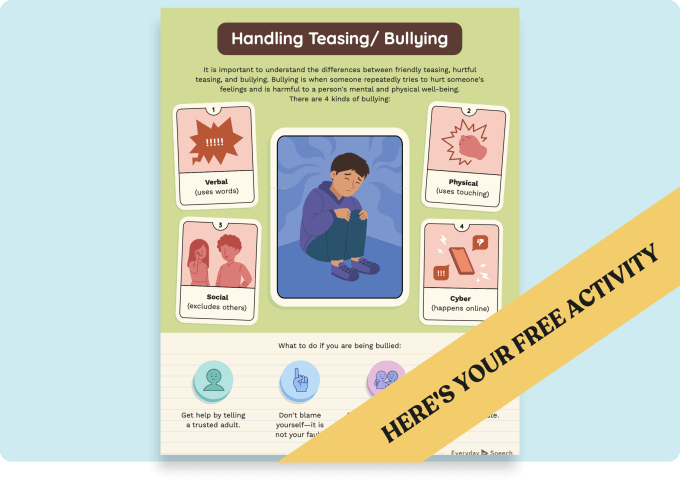Teaching Appropriate Voice Volume in Conversation for Kindergarten Students
Get free social skills materials
No-prep lessons on self-regulation, emotional recognition, conversation skills, and more.
Sign up hereIntroduction
One crucial aspect of effective communication is the ability to control our voice volume during conversations. Teaching this skill to kindergarten students helps them develop strong social-emotional skills that will benefit them throughout their lives. When students learn to adjust their voice volume to an appropriate level, it promotes positive interactions, clear communication, and fosters a respectful environment.
No-Prep Activity: The Volume Control Game
This fun and engaging activity requires no preparation or materials and can be easily adapted for kindergarten students. The Volume Control Game helps students practice adjusting their voice volume in a playful and interactive way.
- Begin by gathering your students in a circle.
- Explain that you will be playing a game to practice using an appropriate voice volume for different situations.
- Choose one student to be the “volume controller” and stand in the center of the circle. The volume controller will use hand gestures to indicate whether the class should speak louder, quieter, or maintain their current volume.
- As the educator, start a conversation with a student in the circle. For example, you could ask about their favorite animal or what they did over the weekend.
- The volume controller will adjust the class’s volume during the conversation using their hand gestures. The rest of the students should follow the volume controller’s cues and adjust their listening volume accordingly.
- After a few minutes, switch the volume controller with another student and continue the activity.
- Repeat the process until all students have had a turn as the volume controller.
This activity not only helps kindergarten students practice using an appropriate voice volume, but it also encourages active listening and cooperation among classmates.
Discussion Questions
After completing the Volume Control Game, use these discussion questions to stimulate further conversation and reflection on the importance of using an appropriate voice volume:
- Why is it important to use an appropriate voice volume during conversations?
- How did it feel when the volume controller asked you to speak louder or quieter? How did you adjust your voice volume?
- Can you think of a situation where you might need to use a quieter voice? How about a louder voice?
- How can using an appropriate voice volume help you communicate better with others?
- What are some strategies you can use to remember to adjust your voice volume during conversations?
Related Skills
Teaching appropriate voice volume is just one aspect of developing strong social-emotional skills in kindergarten students. Other related skills that can enhance students’ communication abilities include:
- Active Listening: Encouraging students to pay attention, make eye contact, and respond appropriately during conversations.
- Nonverbal Communication: Helping students understand and interpret body language, facial expressions, and gestures.
- Turn-Taking: Teaching students to patiently wait for their turn to speak and to avoid interrupting others during conversations.
- Empathy: Fostering an understanding of others’ feelings and perspectives, and encouraging students to respond with kindness and support.
Next Steps
If you’re interested in exploring more activities and resources to help your kindergarten students develop strong social-emotional skills, sign up for free sample materials at Everyday Speech. You’ll find a variety of engaging and effective resources designed to support students’ social-emotional learning journey.

